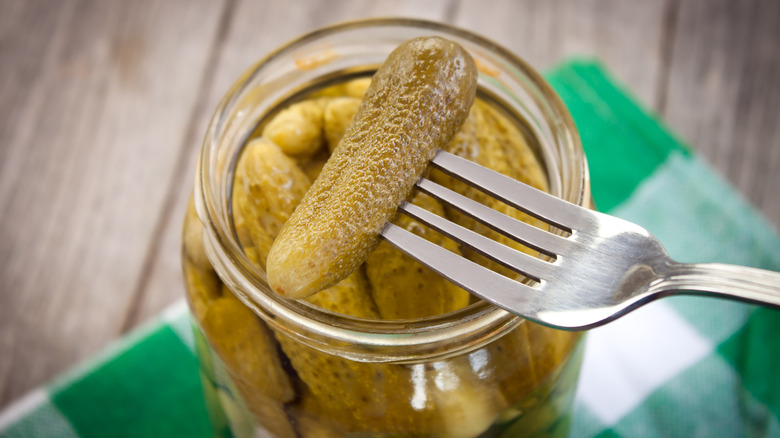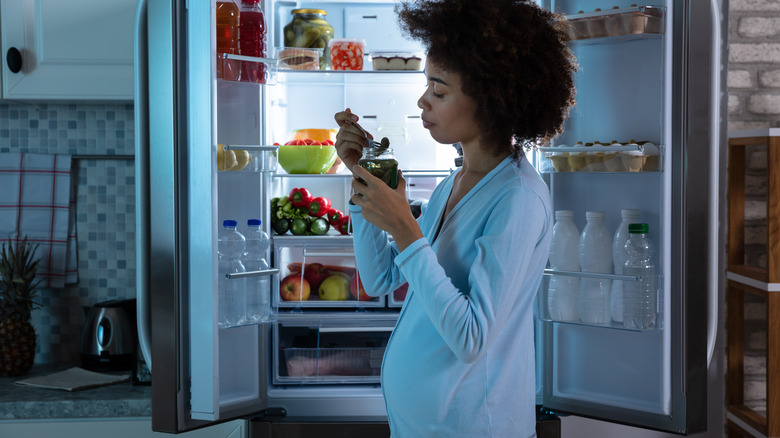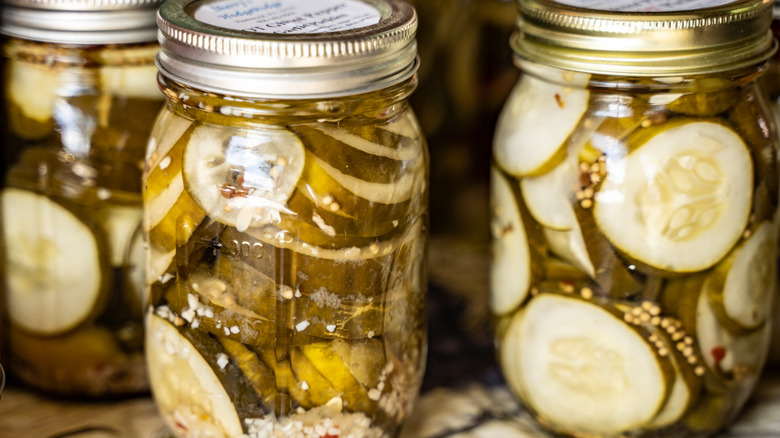Here's Why You're Craving Pickles
There's something so satisfying about crunching into a tangy, salty pickle. So much so that many people often experience strong cravings for pickles, from pregnant women to athletes to children and virtually everyone in between. While it's true that a vocal minority of people despise pickles and all they stand for, intense desires for these fermented or vinegar-soaked cucumbers have a basis in science.
An urge for pickles could be clueing you into a health issue, according to Cleveland Clinic, or it could be a way for pregnant people to bounce back from the nutritional deficit that often accompanies morning sickness, explained by Healthline. Eating pickles and other extremely salty foods also engages the part of your brain that releases feel-good chemicals, which might cause you to return to the jar again and again. While the sodium found in pickles can be problematic for people with certain health conditions, warns Healthline, or when eaten in large amounts, pickle cravings are perfectly natural and may offer some wellness benefits.
A pickle craving could mean that you're dehydrated
The sodium in pickle juice serves as a powerful electrolyte, which are minerals, capable of hydrating the body, explains Cleveland Clinic. Often found in sports drinks as well as foods like spinach and bananas, electrolytes get lost through bodily functions like sweating and replacing them is key to warding off dehydration. That could mean a strong yearning for pickles or pickle juice is actually a sign that you're dehydrated.
Dehydration can result from illness that causes vomiting and diarrhea, as well as rigorous workouts and hot weather, according to Mayo Clinic. Along with a sudden desire for pickles, other signs indicate you could be dehydrated. You may feel particularly thirsty, as well as tired, confused, and perhaps even dizzy. Also, dehydration can decrease the rate at which you urinate, even if you're taking in a ton of fluids. Most people can avoid dehydration by drinking an adequate amount of water each day, which equates to 11.5 cups for women and 15.5 cups for men, as recommended by Mayo Clinic.
Why one pickle is rarely ever enough
While the dehydration link to pickles is pretty compelling, these funky, tangy cucumbers may also be acting on the part of your brain that produces feel-good chemicals, claims Pure Wow. This is similar to your body's response to sugar, which rewards your pleasure centers by releasing dopamine and makes you want to eat more sugary treats, explains The Conversation. Salt causes the same sort of brain response, so you naturally want to eat more briny pickles to continue to receive the good feelings, according to Healthline.
Also, the more sodium-rich food you eat, the higher your tolerance will be to said food. Accordingly, you'll need to eat more pickles to get the feeling you're after. This may explain why stopping at a single pickle is challenging, as your brain is likely craving more, especially if you're a bona fide pickle aficionado. While consuming too many pickles at once can lead to unpleasant symptoms like gassiness and heartburn, consuming a reasonable amount shouldn't induce these ill feelings, recommends Livestrong.
Reasons why pickles are a common craving during pregnancy
Among the many foods pregnant women have a taste for, pickles seem to be at the top of the list. While there are no clear answers to why this is, one possible reason could be due to hormonal fluctuations, which contribute to bouts of nausea commonly known as morning sickness, as claimed by Healthline. Nausea is most prevalent during the first trimester, which negatively impacts a person's appetite. As a result, some posit that food cravings are a way for the body to make up for its lack of nutrition during the first few months of pregnancy.
Similarly, pregnancy is thought to affect a person's sense of taste and smell. These changes may lead to a craving for foods like pickles and other off-the-wall choices. Pickle cravings may also be cultural, as different people experience different cravings depending on where they live. For instance, pregnant women in Korea regularly indulge in briny seaweed soup, while Finnish women can't get enough chocolatey treats while pregnant.
Health benefits associated with pickles
There are two methods for making pickles. Fermentation involves giving vegetables, such as cucumbers, a saltwater bath for a period of time, which allows bacteria to feast on the sugars in the vegetables. The other pickle-making process involves vinegar, which is actually the most common technique when it comes to storebought pickles. Fortunately, both varieties are associated with some surprising benefits.
Regular consumption of fermented foods helps combat inflammation throughout the body, which boosts overall wellness. Also, fermented foods may have a positive effect on insulin resistance, which is when the body fails to react appropriately to insulin produced by the pancreas, according to the Cleveland Clinic. As for pickles soaked in vinegar, possible benefits include better management of blood glucose levels and enhanced appetite suppression, which is helpful for managing a healthy weight, explains Healthline. Keep in mind that most pickles are high in sodium, which can also pose health issues, as warned by Healthline. In this case, you can control how much sodium is included in the pickle recipe by making your own at home.




